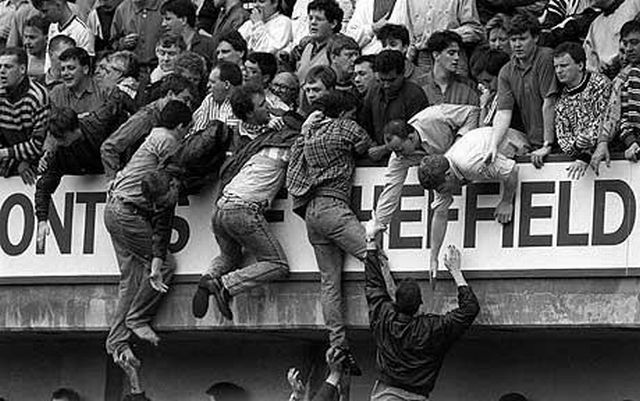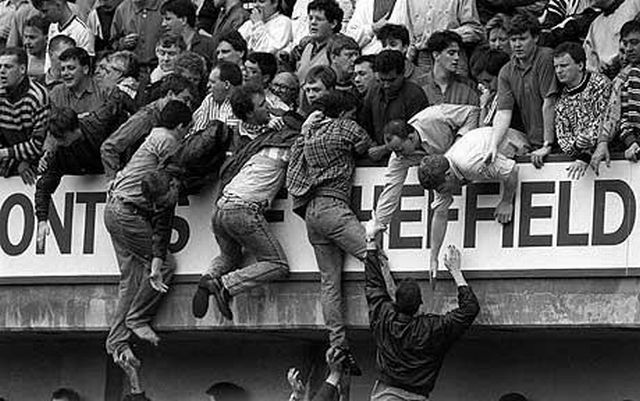Sheila Coleman, spokeswoman for the Hillsborough Justice Campaign gave the first lecture yesterday in the 2012 Critical Research Seminar Series at Liverpool John Moores University Centre for the Study of Crime, Criminalisation and Social Exclusion (CCSE). It was a timely event, given the recent publication of the report of the Hillsborough Independent Panel, an event that marked a significant turning point in the struggle for the truth about what led to the deaths of the 96 victims of the Hillsborough disaster in 1989.

Sheila titled her presentation Hillsborough: Collusion and Cover-Up, and in it she gave an impassioned account of the long struggle by the survivors, their relatives and supporters for truth and justice. Sheila reviewed the key events in a campaign which she described as advancing and receding in waves over the years – from the publication of the Taylor Report in the immediate aftermath of the disaster, the shock of the inquest verdicts, the establishment of the Stuart-Smith Scrutiny by Labour Home Secretary Jack Straw in 1997, the Information Commissioner’s order last year that the 1989 Cabinet papers relating to the disaster be released under a Freedom of Information request, the subsequent e-petition and House of Commons debate, to the publication on 12 September of the report of the Hillsborough Independent Panel. Sheila spoke of the emotional impact of all these events on families and survivors affected by this disaster, and concluded by setting out how the Hillsborough Justice Campaign will continue to fight for justice.
Sheila recalled the frustration that she – and the survivors and their families – felt in the early days. With the help of funding from Liverpool City Council, she began work on a project to gather evidence whilst employed as a lecturer at Edge Hill University. At the time, she recalled, few people, other than those who had been there on the day, would believe that there had been a cover-up. In her lecture, Sheila traced the steps by which evidence of the cover-up had been documented.
She began by taking us back to the Interim report of the Taylor Inquiry, with its ‘devastating criticism of the police’ (in Margaret Thatcher’s words) – so devastating, indeed, that Thatcher would not accept it – ‘Is that for us to welcome?’ This was a time when, as writer Kevin Sampson noted in the Observer in September:
Anyone who bucked against the Tories’ values was deemed a “wrecker.” The play-out to the Tom Robinson Band’s 1979 song Power In The Darkness lists a catalogue of “wreckers” including “… football hooligans, juvenile delinquents, lesbians and left-wing scum. […] A year or two after Power In The Darkness, Tom Robinson might have added “scousers” to that ironic list of demons. The 1980s oversaw a radical transformation in Liverpool’s national standing and its citizens’ popular perception. Gone were the lovable Merseybeat bands of the 1960s, and the daffy but adorable Liver Birds. In their place came a family of incorrigible scroungers, in Bread, followed by a litany of skivers, whingers and whiners. […]
Scousers and football supporters were, as Sheila, recalled, regularly branded ‘animals’, and for that were herded into pens. It was a time when the police acted with impunity, and Hillsborough was merely a continuation of police attitudes and behaviour revealed in the riots of 1981 and the miners’ strike of 1984. She has always seen Hillsborough in the context of class: the conflicts of the 1980s and the persistent hostility of the political elite towards the working class.
From Thatcher, Sheila moved on to examine the actions of the Labour government which came to power in 1997, and especially of Jack Straw, Home Secretary at the time. She described how Jack Straw, having promised a new inquiry, in June 1997 announced there were no grounds for establishing one, instead proposed an ‘independent examination of the alleged new evidence’ by senior legal figures. The ‘alleged’ new evidence had, in fact, been taken to the High Court by the Hillsborough Support Group in 1993; it was the same evidence which the report of the Independent Panel in September had drawn upon. The Stuart-Smith Scrutiny was a sham, allowing Straw to conclude, ‘I do not believe that a further inquiry could or would uncover significant new evidence or provide any relief for the distress of those who have been bereaved’.
Sheila faced the question of divisions amongst the survivors and the families head-on in a section of her talk that explored the ‘collusion’ in its title. She described the tensions that had led to the split between the Justice Campaign which she has represented, and the Hillsborough Steering Committee. These divisions reflected, amongst other things, differences over how far to place trust in the lawyers hired to represent them. For example, Doug Fraser, the lead solicitor representing families at the 1990 inquest, suggested the cut-off point for evidence should be 3.06pm a full nine minutes earlier than the controversial 3.15pm eventually imposed by the coroner. He also told South Yorkshire Police and the coroner that some families wanted to use the inquests to get their 15 minutes of fame and that some were hotheads. Overall, Sheila argued ‘you couldn’t blame the inquest jury for their verdict, given the pitiful evidence presented by the lawyers’.
Sheila also spoke of the sense of disbelief and shock experienced by the families when Norman Bettison was appointed Chief Constable of Merseyside in 1998, an event that was marked by a Justice Campaign petition against the appointment and a sit-in at the Police Authority HQ on the day that Bettison took up his post. As revealed in the Independent Panel report, Bettison was a member of an elite team of South Yorkshire police officers tasked with orchestrating a smear campaign against the victims – the campaign that achieved its most notorious success with the Sun’s ‘The Real Truth’ front page. Sheila noted that when he retires as Chief Constable of West Yorkshire police next March, Bettison will receive a pension from Merseyside Police of £88,000.
Moving on to discuss the Independent Panel report, Sheila identified the key findings: the documentation of the police and institutional cover-up (for example, in the ambulance service), the revelation that 41 of the 96 could have been saved, the taking of blood alcohol samples from the victims (including a ten year old boy) and, when that revealed nothing untoward, the use of the national police computer to seek evidence of criminal activity amongst the 96. She provided a vivid account of the unveiling of the report in the Anglican cathedral on 12 September: the gasps that echoed around the cathedral at the revelation that 41 could have lived, and the thuds as individuals fainted and fell to the floor.
But, despite the official confirmation of the failings and of cover-up, Sheila felt disappointment that the report had let the Thatcher government off the hook, and had glossed over the role of the West Midlands police, the the major investigating force for all inquiries into the Hillsborough disaster.
Finally, Sheila turned to the situation now, in October 2012. Her conclusion: nothing’s changed. The accidental death verdict still stands, and no police officer has been sacked or suspended (and, as a member of the audience noted, the Football Association, which authorised the staging of the FA Cup semi-final at Hillsborough despite the ground not having a valid safety certificate, seems to have got off scot-free).
On 16 October, the Commons Home Affairs committee will hear evidence from the families, and on 22 October there will be a full Commons debate. But, Sheila argued, what is really crucial is that pressure is kept up on the Attorney-General to quash the inquest verdicts and order a new inquest, on the DPP to consider criminal prosecutions in the light of the Independent panel report, and for a new public inquiry. Such pressure needs to be political, as much as legal.
One small example of a successful action was the protest which led, last week, to Morrisons in Liverpool dropping a promotion which knocked ten quid off your bill if you bought the Sun. But what was also needed was continuing support for survivors and families enduring renewed trauma after September 12th – and for unity amongst the families and their the supporters (though a recent tweet about Sheila Coleman ‘being divisive with her calls for unity’ suggest that might be some time coming).
The evening before hearing Sheila Coleman speak, I had watched Hillsborough, Jimmy McGovern’s brilliant dramatic rendition of the events of 15 April 1989 and the cover-up that followed. It seemed to me, watching it again, that this was probably McGovern’s finest work. The dramatisation of the unfolding tragedy in the stadium is a brilliant interweaving of drama with documentary footage. The section that still stands out for me is the inquest and the despair and anguish of the relatives when the ‘accidental death’ verdict is announced. The decision of the coroner to rule out the choice of a manslaughter verdict evoked parallels with the trail of PC Harwood, charged with the manslaughter of Ian Tomlinson and acquitted despite the evidence in photographs and on video.
Christopher Eccleston – who played Trevor Hicks, the then chairman of the Hillsborough Family Support, whose two daughters, Sarah, 19, and Victoria, 15, died in the 1989 disaster – said of Hillsborough:
Beyond Merseyside, no one knew the truth about what happened at Hillsborough. People had swallowed the lies that the right-wing Press told, together with what the government and the police put out there. Jimmy wrote it to correct those lies and, most importantly, to allow the families to grieve – because the lies devastated and destroyed the grieving process.
See also
- Hillsborough Independent Panel: disclosed material and report
- The Hillsborough disaster: detailed account of the history of the disaster and its aftermath (Justice Campaign)
- Hillsborough Justice Campaign: website, not updated since 2009
- Hillsborough Justice Campaign: Facebook page
- Those who were left behind: Why have the survivors of Hillsborough been forgotten? And why are campaigners riven by dissent? (Guardian, May 1999)


